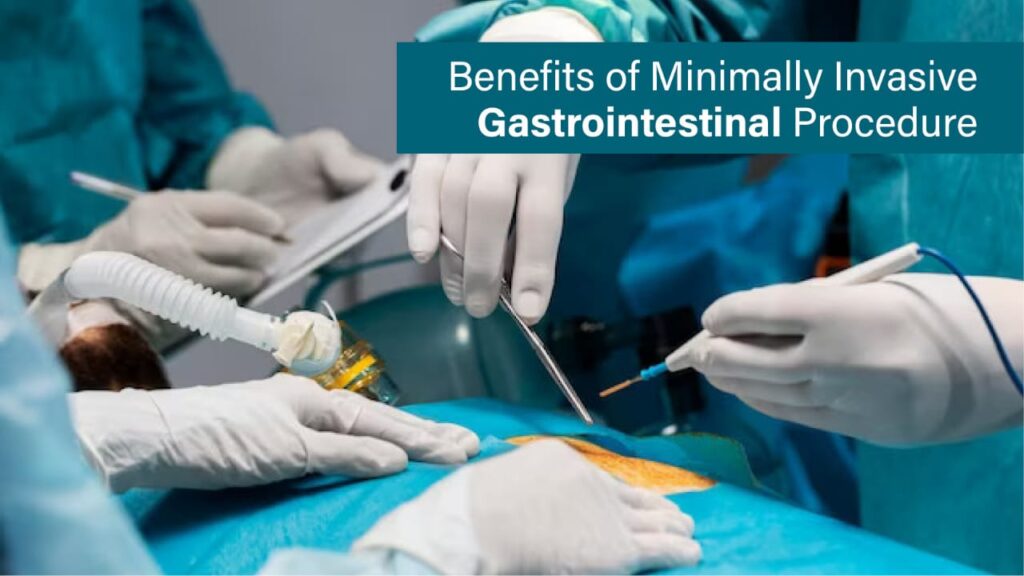In the realm of medical advancements, the landscape of gastrointestinal procedures has been transformed by the emergence of minimally invasive techniques. These procedures have revolutionized the field, offering patients a host of advantages over traditional open surgeries. From shorter hospital stays, and shorter recovery times to reduced complications, minimally invasive gastro procedures have changed the way we approach gastrointestinal disorders. At Trustwell Hospitals Institute of Gastrosciences, we utilize the latest technology and pass on the advantages of these procedures, to our patients who benefit the most from them.
Advantages of Minimally Invasive Gastrointestinal Procedures:
- Smaller Incisions, Less Scarring: A cornerstone of minimally invasive procedures is the use of small incisions or natural orifices, minimizing damage to surrounding tissues. This results in smaller scars, improved cosmetic outcomes, and less emotional distress for patients.
- Reduced Pain and Discomfort: Minimally invasive techniques cause less trauma to tissues, leading to diminished postoperative pain and discomfort. This allows for a more comfortable recovery period and often reduces the need for strong pain medications.
- Shorter Hospital Stay: Faster recovery, reduced infections, lower costs, improved patient satisfaction.
- Faster Recovery: Compared to traditional open surgeries, minimally invasive procedures typically entail shorter hospital stays and recovery times. Patients can return to their daily activities sooner, enhancing their overall quality of life.
- Lower Risk of Infection: Smaller incisions reduce the risk of infections. This is especially crucial in gastrointestinal procedures, as infections can lead to serious complications and prolonged recovery.
- Less Blood Loss: Minimally invasive techniques are associated with reduced blood loss during surgery, which translates to lower transfusion rates and decreased risk of anemia-related complications.
- Better Preservation of Tissues: The precise nature of minimally invasive procedures allows surgeons to preserve healthy tissues surrounding the affected area. This is particularly beneficial in gastrointestinal surgeries, where tissue preservation can greatly impact functionality.
- High Precision: Advanced imaging and surgical tools enable surgeons to perform procedures with a high degree of precision. This accuracy is crucial in delicate areas of the gastrointestinal tract.
- Lower Risk of Hernias: The smaller incisions in minimally invasive procedures often result in a lower risk of incisional hernias, which can be a common concern in open surgeries.
Who Can Benefit from Minimally Invasive Gastrointestinal Procedures?
- Gastroesophageal Reflux Disease (GERD) Patients: Minimally invasive techniques like laparoscopic fundoplication offer relief to individuals suffering from GERD by tightening the lower esophageal sphincter, reducing acid reflux.
- Gallstone Sufferers: Laparoscopic cholecystectomy is a common minimally invasive procedure for gallstone removal. Patients benefit from smaller incisions and faster recovery times.
- Obesity Patients: Minimally invasive bariatric surgeries like laparoscopic gastric bypass or sleeve gastrectomy aid in weight loss and managing obesity-related health issues.
- Colorectal Conditions: Patients with conditions like diverticulitis, Crohn’s disease, or colorectal cancer can benefit from minimally invasive procedures like laparoscopic colectomy, which offer quicker recovery and lower risk of complications.
- Hernia Patients: Individuals with inguinal, umbilical, or incisional hernias can opt for laparoscopic hernia repair, which reduces the risk of recurrence and postoperative discomfort.
- Inflammatory Bowel Disease (IBD) Patients: Minimally invasive techniques can help alleviate symptoms of IBD by removing affected portions of the intestines, promoting a better quality of life.
- Gastrointestinal cancers like colon and rectal cancer surgeries
Why Minimally Invasive Gastrointestinal Procedures Have Gained Prominence?
- Technological Innovations: Advancements in endoscopic tools, robotic assistance, and imaging techniques have made minimally invasive procedures more precise and accessible.
- Patient-Centric Approach: Patients prefer minimally invasive procedures due to their shorter hospital stays, faster recovery, and improved cosmetic outcomes.
- Reduced Healthcare Costs: Quicker recovery times mean fewer days spent in the hospital, leading to cost savings for both patients and healthcare systems.
- Less Anesthesia: Minimally invasive procedures often require less anesthesia, which can be beneficial for patients with underlying health conditions.
- Evolving Expertise: Surgeons specializing in minimally invasive techniques have honed their skills, ensuring safer and more effective procedures.
Conclusion:
Minimally invasive gastrointestinal procedures have ushered in a new era of healthcare, redefining the way we approach gastrointestinal disorders. With their myriad benefits, from reduced pain and faster recovery to better preservation of healthy tissues, these procedures offer patients a superior alternative to traditional open surgeries. As technology continues to advance and medical expertise evolves, the realm of minimally invasive gastro procedures is bound to expand, Trustwell Hospitals is providing patients with even more effective and patient-centric treatment options for various gastrointestinal conditions.
